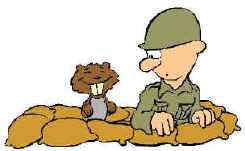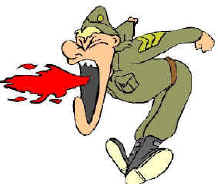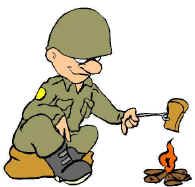Alerts
| Willard:
The war was being run by a bunch of four star clowns who were gon'a end up giving the whole circus
away.
Apocalypse Now (1977) |
D Vautier
4/2012
The cold war was in full swing. This was Germany, my
friend, 1965, not like some rosey-posey candy-ass pussyfied play-land adventure; this was a
place where real
bullets could fly, with real nuclear tipped missiles next door, and the real possibility of invasion from the
East Germans.
We were stationed in Bamberg, a medium sized town in northern
Bavaria, just 22 miles from the "big nasty" iron curtain to the northeast,
teaming with perhaps a few million knuckle-dragging East German and Russian troops in Czechoslovakia just itching for a little toe-to-toe with the
Amerikanish Aggressores.
Besides,
Johnson was making all kinds of trouble in North Vietnam by
bombing Hanoi and Haiphong harbors. Things were
tense. We could tune in the East German radio stations any time to get
an idea of the rhetoric (since we only got cosmetic powder-puff half-assed stuff from Stars and
Stripes). Words
like “evil warmongers” and “American gangsters” were often used on the East
German radio to
describe the latest American acts of oppression, and needed little by way of translation to be
understood.
So what did we do to prepare for this ever possible enemy onslaught? We had
alerts.
 Once each and every month, at some undisclosed time they called an alert.
This was
an order to leave our nice cozy warm barracks with our stereos and Mamas and
Papas, Beach Boys and Beatle music, and warm well heated rooms
and head for the wet soggy, muddy cold hills. Where did we go? Somewhere
out there and that ain’t here. We had to very quickly load up all our T.O.N.E. gear and move out into the field and be
prepared for up to a six months stay,
sometimes in winter, most of the times in rain, but they always seem to
pick the worst possible time each month to have an alert.
Once each and every month, at some undisclosed time they called an alert.
This was
an order to leave our nice cozy warm barracks with our stereos and Mamas and
Papas, Beach Boys and Beatle music, and warm well heated rooms
and head for the wet soggy, muddy cold hills. Where did we go? Somewhere
out there and that ain’t here. We had to very quickly load up all our T.O.N.E. gear and move out into the field and be
prepared for up to a six months stay,
sometimes in winter, most of the times in rain, but they always seem to
pick the worst possible time each month to have an alert.
An alert usually lasted a few hours, or as long as three days. Nobody
knew if it was for real. Nobody
knew when it would be called or how long it would last. But one thing was for certain—they would happen once a month.
 ALERT
was a nasty word guaranteed to strike fear into the bravest. All you had to say was
ALERT (kind of like FIRE, or AIDS, or
TERRORIST or AVALANCHE or EARTHQUAKE), and people would immediately turn a distinct shade
of purple and go into
agitated states of anxiety. Tempers
would explode, insults were generously exchanged, and nerves became raw and exposed.
ALERT
was a nasty word guaranteed to strike fear into the bravest. All you had to say was
ALERT (kind of like FIRE, or AIDS, or
TERRORIST or AVALANCHE or EARTHQUAKE), and people would immediately turn a distinct shade
of purple and go into
agitated states of anxiety. Tempers
would explode, insults were generously exchanged, and nerves became raw and exposed.
We
practiced alerts frequently. We
knew who was responsible for what equipment, who drove what truck, and when
each truck was to arrive at the survey control room to collect equipment.
We had about 30 minutes to load all this equipment and clear the area, so it was very
important to be prepared, always prepared for what those nasty Ruskies might
do, along with their East German tin-heads.
One time our platoon
sergeant decided to move our platoon control room from the basement to the
forth floor (not a good idea--everybody was mad as hell). So we had
to haul everything up to the forth floor. The next day they
called an alert and we had to haul all our stuff back down and load it in
the trucks. The operation was complete chaos and took so long that we
left late and got written up. The platoon sergeant moved the control
room back to the basement.
 It
was not at all unusual to go out into the field missing trucks, equipment, men,
clothes, food, underwear, rifles, and rain-gear, (because it was always raining
when we had an alert. God was not our friend). Sometimes guys would get into the wrong truck, or wind up in the
wrong unit, or still have their
“civies” on, or forget something like underwear. Sometimes people got lost and could not find the bivouac area, trucks
were always getting stuck in the mud. But the most important
thing was to get out of there in 30 minutes or less, because that’s what
the generals were looking for and that's what the battery captain could put on his report.
It
was not at all unusual to go out into the field missing trucks, equipment, men,
clothes, food, underwear, rifles, and rain-gear, (because it was always raining
when we had an alert. God was not our friend). Sometimes guys would get into the wrong truck, or wind up in the
wrong unit, or still have their
“civies” on, or forget something like underwear. Sometimes people got lost and could not find the bivouac area, trucks
were always getting stuck in the mud. But the most important
thing was to get out of there in 30 minutes or less, because that’s what
the generals were looking for and that's what the battery captain could put on his report.
When
I got my discharge and came back stateside, one of my biggest pleasures was never
again having to worry about the next alert.
 Once each and every month, at some undisclosed time they called an alert.
This was
an order to leave our nice cozy warm barracks with our stereos and Mamas and
Papas, Beach Boys and Beatle music, and warm well heated rooms
and head for the wet soggy, muddy cold hills. Where did we go? Somewhere
out there and that ain’t here. We had to very quickly load up all our T.O.N.E. gear and move out into the field and be
prepared for up to a six months stay,
sometimes in winter, most of the times in rain, but they always seem to
pick the worst possible time each month to have an alert.
Once each and every month, at some undisclosed time they called an alert.
This was
an order to leave our nice cozy warm barracks with our stereos and Mamas and
Papas, Beach Boys and Beatle music, and warm well heated rooms
and head for the wet soggy, muddy cold hills. Where did we go? Somewhere
out there and that ain’t here. We had to very quickly load up all our T.O.N.E. gear and move out into the field and be
prepared for up to a six months stay,
sometimes in winter, most of the times in rain, but they always seem to
pick the worst possible time each month to have an alert. ALERT
was a nasty word guaranteed to strike fear into the bravest. All you had to say was
ALERT (kind of like FIRE, or AIDS, or
TERRORIST or AVALANCHE or EARTHQUAKE), and people would immediately turn a distinct shade
of purple and go into
agitated states of anxiety. Tempers
would explode, insults were generously exchanged, and nerves became raw and exposed.
ALERT
was a nasty word guaranteed to strike fear into the bravest. All you had to say was
ALERT (kind of like FIRE, or AIDS, or
TERRORIST or AVALANCHE or EARTHQUAKE), and people would immediately turn a distinct shade
of purple and go into
agitated states of anxiety. Tempers
would explode, insults were generously exchanged, and nerves became raw and exposed. It
was not at all unusual to go out into the field missing trucks, equipment, men,
clothes, food, underwear, rifles, and rain-gear, (because it was always raining
when we had an alert. God was not our friend). Sometimes guys would get into the wrong truck, or wind up in the
wrong unit, or still have their
“civies” on, or forget something like underwear. Sometimes people got lost and could not find the bivouac area, trucks
were always getting stuck in the mud. But the most important
thing was to get out of there in 30 minutes or less, because that’s what
the generals were looking for and that's what the battery captain could put on his report.
It
was not at all unusual to go out into the field missing trucks, equipment, men,
clothes, food, underwear, rifles, and rain-gear, (because it was always raining
when we had an alert. God was not our friend). Sometimes guys would get into the wrong truck, or wind up in the
wrong unit, or still have their
“civies” on, or forget something like underwear. Sometimes people got lost and could not find the bivouac area, trucks
were always getting stuck in the mud. But the most important
thing was to get out of there in 30 minutes or less, because that’s what
the generals were looking for and that's what the battery captain could put on his report.